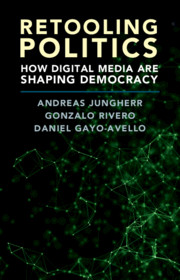Book contents
- Retooling Politics
- Retooling Politics
- Copyright page
- Contents
- Acknowledgments
- 1 The Rise of Digital Media and the Retooling of Politics
- 2 The Flow of Political Information
- 3 Reaching People
- 4 The Effects of Political Information
- 5 Digital Media and Collective Action
- 6 Changing Organizations
- 7 Data in Politics
- 8 Digital Media and Democracy
- 9 Digital Media in Politics
- References
- Index
1 - The Rise of Digital Media and the Retooling of Politics
Published online by Cambridge University Press: 17 June 2020
- Retooling Politics
- Retooling Politics
- Copyright page
- Contents
- Acknowledgments
- 1 The Rise of Digital Media and the Retooling of Politics
- 2 The Flow of Political Information
- 3 Reaching People
- 4 The Effects of Political Information
- 5 Digital Media and Collective Action
- 6 Changing Organizations
- 7 Data in Politics
- 8 Digital Media and Democracy
- 9 Digital Media in Politics
- References
- Index
Summary
It is June 2015 and the famous American reality-TV personality Donald Trump announces his bid for the Republican nomination to the 2016 race for the US presidency. Journalists, Republican donors, and prospective voters now have to decide if they should take his bid seriously. The history of American presidential campaigns is littered with celebrities and third-party candidates who tried to capitalize on their fame or success by entering politics. While some like Ronald Reagan, Arnold Schwarzenegger, or Michael Bloomberg proved to be successful, most celebrity candidacies turned out to be mere blips in the history of American politics. How should observers decide on whether Donald Trump’s bid fell into the first or the second category? The Trump campaign portrayed their candidate as being in touch with the long-forgotten people lacking a voice in US politics (Green 2017), a group that the campaign of the Democratic frontrunner Hillary Clinton helpfully labeled “deplorables” (Chozick 2016). To assess the validity of Trump’s claims, journalists decided to take to social media as a source of how well his message resonated with the public.
- Type
- Chapter
- Information
- Retooling PoliticsHow Digital Media Are Shaping Democracy, pp. 1 - 29Publisher: Cambridge University PressPrint publication year: 2020
- 2
- Cited by

